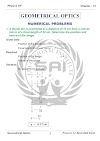
- Parallel Vectors
- Anti-Parallel Vectors
- Equal Vectors
- Negative of a Vector
- Free Vector: (Parallel shift of Vector)
- Null Vector
- Position Vector
- Unit Vector
1. Parallel Vectors
Vectors that have the only same direction but do not have the same magnitude
are called Parallel Vectors.

2. Anti-Parallel Vectors
Vectors that are in opposite directions and do not have the same magnitude are called Anti-Parallel Vectors.

3. Equal Vectors
Vectors that have the same magnitude and have the same direction are called equal vectors.

4. Negative of a Vector
A vector that is equal in magnitude but opposite in direction is called the negative of a Vector.

5. Free Vector: (Parallel shift of Vector)
A free vector is that which can be displaced parallel to it and applied at any point." It can be completely, specified by its magnitude and angles with coordinate axes.

6. Null Vector
When two vectors have equal magnitudes but opposite
directions, then their resultant is zero while the direction is undefined. We
can say that the resultant vector has zero magnitudes. Such a vector
whose magnitude is zero is called a Null or Zero Vector. We can never
draw a null vector, hence it has no direction or it may have any direction
termed as arbitrary direction; usually denoted `\vecO`
`\vecO` `=` `\vecA` `+` (`-``\vecA`) `=` Null Vector
7. Position Vector
To locate the position of a point in space, a vector is drawn from some reference point (normally origin) to that point. Such a vector is called the position vector.

8. Unit Vector
A vector whose magnitude is unity (one) and has a specific direction is called Unit Vector.
Unit Vector is represented y small letters and with a "hat" or "Cap" (^).
`\vecA` `=` `A` `\hata`
`Unit VECTOR` `=\frac(VECTOR)(magnitude of VECTOR)`
`hata` `=` `\frac(vecA)(A)`







0 Comments